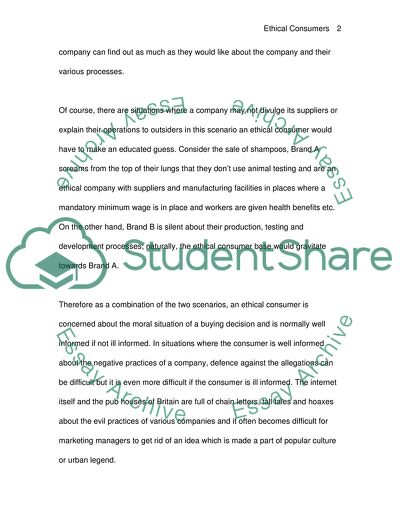
- Home
- Free Samples
- Premium Essays
- Editing Services
- Extra Tools
- Essay Writing Help
- About Us
- Studentshare
- Subjects
- Miscellaneous
- Marketing ethics
Marketing ethics - Essay Example

- Subject: Miscellaneous
- Type: Essay
- Level: Undergraduate
- Pages: 4 (1000 words)
- Downloads: 0
- Author: luettgensabina
Extract of sample "Marketing ethics"
Consumer ethics depend on information since it is the lifeline of ethical decisions (Ethical Consumer, 2006). Information about companies, their procedures, activities and investments is very easily accessed, shared and distributed in the UK. Therefore, anyone with even a passing interest in a certain company can find out as much as they would like about the company and their various processes. Of course, there are situations where a company may not divulge its suppliers or explain their operations to outsiders in this scenario an ethical consumer would have to make an educated guess.
Consider the sale of shampoos, Brand A screams from the top of their lungs that they don’t use animal testing and are an ethical company with suppliers and manufacturing facilities in places where a mandatory minimum wage is in place and workers are given health benefits etc. On the other hand, Brand B is silent about their production, testing and development processes; naturally, the ethical consumer base would gravitate towards Brand A. Therefore as a combination of the two scenarios, an ethical consumer is concerned about the moral situation of a buying decision and is normally well informed if not ill informed.
In situations where the consumer is well informed about the negative practices of a company, defence against the allegations can be difficult but it is even more difficult if the consumer is ill informed. The internet itself and the pub houses of Britain are full of chain letters, tall tales and hoaxes about the evil practices of various companies and it often becomes difficult for marketing managers to get rid of an idea which is made a part of popular culture or urban legend. For example, a rumour may spread about certain beauty products containing lead, or a certain food product containing viral samples or even certain types of clothing material to be
...Download file to see next pages Read More
- TERMS & CONDITIONS
- PRIVACY POLICY
- COOKIES POLICY